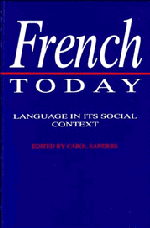Book contents
- Frontmatter
- Contents
- List of figures and maps
- List of tables
- Notes on the contributors
- Acknowledgements
- Introduction
- 1 French: a planned language?
- 2 Sociosituational variation
- 3 Regional variation in France
- 4 The other languages of France: towards a multilingual policy
- 5 The migrant languages of Paris
- 6 Gender and language in French
- 7 The reform of the writing system
- 8 Alternative French
- 9 New words for new technologies
- 10 Language and style in politics
- 11 French and French-based Creoles: the case of the French Caribbean
- 12 French in Africa
- 13 French in Canada
- 14 Sociolinguistic variation and the linguist
- Bibliography
- Index
5 - The migrant languages of Paris
Published online by Cambridge University Press: 05 June 2012
- Frontmatter
- Contents
- List of figures and maps
- List of tables
- Notes on the contributors
- Acknowledgements
- Introduction
- 1 French: a planned language?
- 2 Sociosituational variation
- 3 Regional variation in France
- 4 The other languages of France: towards a multilingual policy
- 5 The migrant languages of Paris
- 6 Gender and language in French
- 7 The reform of the writing system
- 8 Alternative French
- 9 New words for new technologies
- 10 Language and style in politics
- 11 French and French-based Creoles: the case of the French Caribbean
- 12 French in Africa
- 13 French in Canada
- 14 Sociolinguistic variation and the linguist
- Bibliography
- Index
Summary
The situation of the languages of migrants in Paris is not solely a sociolinguistic problem. To understand present-day multilingualism in the capital, we need to reflect a little on the past. Clearly it is impossible to retrace the great migratory movements of each of the groups which have led to the current situation, but it is interesting to review briefly a century of history in order to understand the present. Paris has always been the focal point of people coming to seek work from the four corners of the country, attracting those who spoke Occitan, Breton, Basque – or even French! – and who often specialised in certain domains (for example, those from the Auvergne selling charcoal); they sometimes lived in specific quarters (e.g. Montparnasse for the Bretons). In a few generations they were assimilated linguistically and culturally and merged into the population of Paris: Corsican and Breton are not often heard in the capital today; on the other hand, as we will see, many other languages can be heard.
External economic and political migrations
This internal migration was slowly replaced by migration from outside France, which was first triggered by World War I. To replace the workforce engaged at the front, France took in 100,000 Chinese workers between 1916 and 1918, mostly metal workers. Originating from the province of Zhejiang, in the south-east of China, they spoke different dialects among themselves which were not mutually comprehensible.
- Type
- Chapter
- Information
- French TodayLanguage in its Social Context, pp. 105 - 120Publisher: Cambridge University PressPrint publication year: 1993



